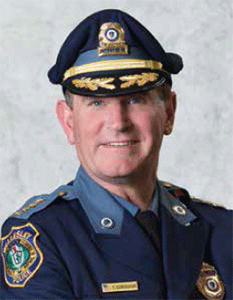
As we all know, crime has no boundaries. The challenges we face in the law enforcement profession are very much shared on a global level. While the severity of those problems may vary across different countries and regions, the challenges of terrorism, cybercrime, human trafficking, drugs, and organized crime can emanate from anywhere in the world, which is why it is imperative that we work together and learn from each other to ensure we all take an effective approach to defending against the common threats posed by international organized crime and terrorism. By doing so, we will enhance the safety and security of citizens and communities worldwide.
In an effort to promote collaboration, information sharing, and the exchange of best practices, we rely heavily upon lessons learned and strategies from all over the globe. That is why in October 2015, at the 122nd Annual International Association of Chiefs of Police (IACP) Conference and Exposition in Chicago, Illinois, we held a Perspective Series session called “Challenges of Policing into the Future.” During this event, police leaders from five countries—Australia, Canada, New Zealand, the United Kingdom, and the United States—discussed the challenges and threats facing policing in an ever-changing global environment. Those leaders included Commissioner Andrew Colvin, Australian Federal Police; Commissioner Bob Paulson, Royal Canadian Mounted Police; Commissioner Mike Bush, New Zealand Police; Director General Keith Bristow, the United Kingdom National Crime Agency; and Director James Comey, the United States Federal Bureau of Investigation.
This session was well-attended and gave attendees an opportunity to hear about the scope of challenges being faced around the world, share ideas on best practices, and learn from global partners in order to work toward the common goals of fighting crime and safeguarding the communities we serve.
Although my time as president of the IACP has really just begun, I have already heavily focused on our international efforts. In November, I attended the 84th INTERPOL General Assembly in Kigali, Rwanda. INTERPOL is an independent intergovernmental organization responsible for ensuring the promotion of mutual assistance between all criminal police authorities within the limits of the laws existing in the different countries and in the spirit of the Universal Declaration of Human Rights.
The theme of this event was INTERPOL 2020: Policing Global Threats in a Dynamic Environment, and I was fortunate enough to join police chiefs and other senior law enforcement officials from around the world to discuss a range of policing and security issues including foreign terrorist fighters, border security, cybercrime, drug trafficking, corruption, and asset recovery.
While in Rwanda, and as part of the IACP’s effort to continue to expand our international relationships and partnerships, the IACP entered into a memorandum of understanding (MOU) with INTERPOL. This MOU will enhance cooperation between IACP and INTERPOL and further our global reach and the services both organizations are able to provideto law enforcement.
Through this MOU with INTERPOL, the IACP will enhance our dialogue and expand the exchange of strategic information and research on a wide range of critical issues facing law enforcement with the ultimate goal of aiding law enforcement in the prevention and suppression of crime. Issues of focus include research related to policing; the strategic analysis and exchange of expertise linked to INTERPOL’s major crime programs (terrorism, organized and emerging crime, and cybercrime); and law enforcement training and education. The MOU also allows for “reciprocal representation” at each other’s meetings and conferences. In the spirit of reciprocal representation, I invited Tim Morris, Executive Director of Police Service INTERPOL, to deliver a keynote address at this year’s IACP Annual Conference in Chicago at the first general assembly.
The IACP also conducted a Regional Meeting on the African continent in the wings of the INTERPOL meeting, which was attended by approximately 30 national police directors, along with other senior directors of international cooperation. At this meeting, we installed the new IACP World Regional Chair for Sub-Saharan Africa, Inspector General Kale Kayihura from Uganda.
In addition to traveling to Rwanda, I recently returned from the annual American Police Community (AMERIPOL) conference in Mexico City, Mexico. AMERIPOL is a nonprofit organization offering services to law enforcement executives in the western hemisphere and enabling the police community to come together and voice their opinions and concerns, with special focus on encouraging regional cooperation. During the conference, I joined other law enforcement officials in discussing the global problems and challenges associated with human trafficking, national security, cybersecurity, information exchange, and immigration. I also discussed the possibility of an MOU between our respective organizations with the president of AMERIPOL, which we will work on during the next quarter. Finally, I met with the director of the Mexican Federal Police, Enrique Galindo, who was selected to be the next president of AMERIPOL. We agreed to write a joint article for The Police Chief and vowed to establish a closer working relationship between AMERIPOL and the IACP. It was a very productive few days of meetings and a lot was learned.
While president of the IACP, I will continue to travel to many other countries, hoping to enhance information sharing and collaboration across national borders so that we can continue to serve and meet the needs of our global policing community. With members in more than 120 countries, the IACP’s international footprint is continually expanding, and its continued growth and expansion is essential to the organization and the law enforcement field. ♦
Please cite as:
Terrence M. Cunningham, “Expanding Our Global Mission and Presence,” President’s Message, The Police Chief 82 (December 2015): 6.


